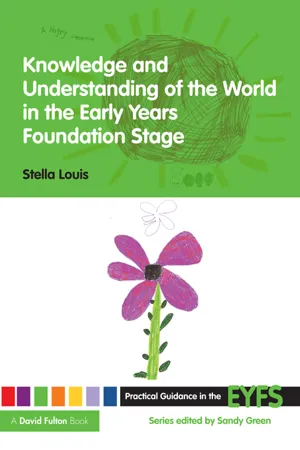
Knowledge and Understanding of the World in the Early Years Foundation Stage
- 166 pages
- English
- ePUB (mobile friendly)
- Available on iOS & Android
Knowledge and Understanding of the World in the Early Years Foundation Stage
About This Book
The Practical Guidance in the Early Years Foundation Stage series will assist practitioners in the smooth and successful implementation of the Early Years Foundation Stage.
Each book gives clear and detailed explanations of each aspect of Learning and Development and encourages readers to consider each area within its broadest context to expand and develop their own knowledge and good practice.
Practical ideas and activities for all age groups are offered along with a wealth of expertise of how elements from the practice guidance can be implemented within all early years settings. The books include suggestions for the innovative use of everyday ressources, popular books and stories.
Knowledge and understanding of the world cuts across all of the EYFS guiding themes and this book will encourage practitioners to think about and develop their own understanding of the implications for inclusion, respect for oneself and for others irrespective of ethnicity, culture or religion, home language, family background, learning difficulties, gender, disabilities or abilities.
Frequently asked questions
Information





























Table of contents
- Cover
- Halftitle
- Title
- Copyright
- Dedication
- Contents
- Acknowledgements
- Introduction
- 1 Exploration and investigation
- 2 Designing and making
- 3 Information and communication technologies
- 4 Time
- 5 Place
- 6 Communities
- Bibliography